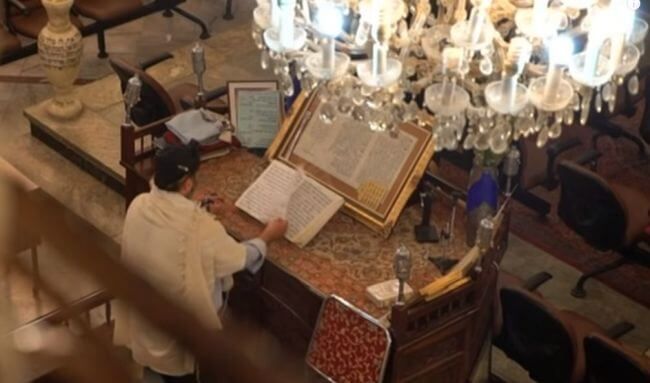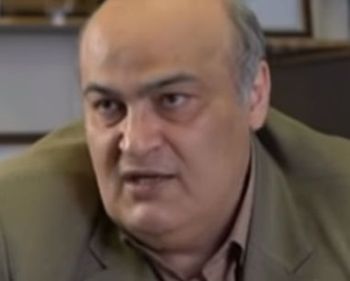Let’s give PBS Newshour’s Reza Sayah the benefit of the doubt concerning his feature report at the lives of Iran’s Jewish minority, the second largest in the Middle East outside of Israel.
Perhaps he was surprised when he heard from community representatives just how happy their lives are as Jews under the Islamic Republic as he tries to elicit more detailed answers from Siamak Morsadegh.
Sayah states that “Morsadegh is an elected member of Iran’s Parliament, proof, he says, that Jews here are a respected minority with religious rights.”
But then, what could Morsadegh be expected to say to a foreign journalist?
Join the fight for Israel’s fair coverage in the news
A rosy picture and religious freedom
Sayah certainly extenuates the positives for the Iranian Jewish community and this is the overall direction of the report. He narrates:
Today, an estimated 15,000 Jews still live here. Most are in the capital, Tehran. There are five Jewish private schools here, several kosher restaurants. And Tehran’s oldest charity hospital was founded and is still run by Jews.
While this might paint a rosy picture, the reality is quite different. According to the Jewish Virtual Library:
Before the revolution, there were some 20 Jewish schools functioning throughout the country. In recent years, most of these have been closed down. In the remaining schools, Jewish principals have been replaced by Muslims. In Tehran there are still three schools in which Jewish pupils constitute a majority. The curriculum is Islamic, and Persian is forbidden as the language of instruction for Jewish studies.
While the US State Department’s International Religious Freedom Report for 2017 says:
According to the Tehran Jewish Committee, five Jewish schools and two kindergartens continued to operate in Tehran, but authorities required their principals to be Muslim. The government reportedly continued to allow Hebrew language instruction but limited the distribution of Hebrew texts, particularly nonreligious texts, making it difficult to teach the language, according to the Jewish community. The government reportedly required Jewish schools to remain open on Saturdays, in violation of Jewish religious law, to conform to the schedule of other schools.

According to Sayah, “Iran’s Jews say they’re also free to travel to Israel, a trip the government bans for all other citizens.”
Yet, according to the JVL and unmentioned in the PBS report, Jews who apply for a passport to travel abroad must do so in a special bureau and are immediately put under surveillance. The government does not generally allow all members of a family to travel abroad at the same time to prevent Jewish emigration.
An absence of antisemitism?
And what about antisemitism? Sayah visits a Tehran synagogue and interviews a congregant:
Here’s one of the most remarkable things about this synagogue. In a region where almost all synagogues are protected with tight security, metal detectors, even armed guards, the doors to this synagogue are open. Worshipers, or anyone else, for that matter, can walk right in.
Manouchehr Behravan used to live in New York City. One thing he values in Iran, he says, is the absence of anti-Semitism.
An absence of antisemitism? The State Department report says:
In December media reported police arrested several Jews on unknown charges; the arrests were widely believed to be related to their religious affiliation. The arrests followed reports of attacks on two synagogues in Shiraz over consecutive nights. In the first instance, attackers broke into the Kenisa’eh Hadash (New Synagogue) and the Hadash Synagogue and desecrated two Torah scrolls and more than 100 prayer books, destroyed furnishings, tefillin, and prayer shawls, and stole silver.

Of course, it’s always easier to claim an absence of antisemitism when disconnected from attacks on Israel. This is by and large how the Iranian Jewish community has protected itself, by disconnecting itself from Israel and Zionism. Getting two Iranian Jews to criticize Israel as Sayah does was probably not very difficult given that cooperating with the Zionist state is an activity punishable by death. Not only that, interviewee Siamak Morsadegh is the sole Jewish MP in the Iranian parliament where the Jewish representative is obligated by law to support Iranian foreign policy and its anti-Zionist position.
A Jewish fig leaf for the regime
What Sayah fails to do when he looks at the Iranian Jewish community is to also consider the situation of all Iranians living under a repressive regime that places so many limits on personal freedoms. By not digging deeper, Sayah effectively becomes an apologist for the Iranian regime and its human rights abuses. It’s worth noting Roya Hakakian in Tablet Magazine who explains:
Jews live in Iran because they nearly always have. Their historical claim to the land is far greater than that of Muslims. Iran was home to the Jews who escaped the Babylonian conquest of Jerusalem in 586 B.C.E., long before Islam had come into being. This history makes Iran a most longstanding home for them.
The regime, too, prefers to keep Iran home for the Jews. It needs to substantiate its claim to “Islamic civility.” It needs to prove itself a leader in the region, in part by way of differentiating itself from its predominantly Arab neighbors.
To stand in contrast against the rest of the Arab nations in the region, Tehran reaches for what it is not entitled to or has even been known to shun. When necessary, it has oddly invoked the glory and power of the Persian Empire and emphasized the Persian-ness of Iran, its uniqueness, its capacity to exercise benevolent tolerance, to debunk unsavory accusations, including anti-Semitism. To do all that, the existence of Jews makes an excellent piece of evidence, a living political “citation.”
Whitewashing the Iranian regime may not have been Sayah’s intention, but his dispatch’s lack of context does exactly that. (Learn more about lack of context and why it makes for deeply problematic journalism.)
“Tehran and Tel Aviv”
Adding one final insult to injury, Sayah concludes:
Many Jews here hope Tehran and Tel Aviv will one day resolve their differences.
Of course, while we also hope that these differences will one day be resolved, it won’t be between Tehran and Tel Aviv. Any future dealings will be taking place with Israel’s capital Jerusalem where its government is located.
Implying Tel Aviv to be the Israeli capital is inaccurate and misleading irrespective of whether one recognizes Jerusalem as the capital.
HonestReporting has submitted a request for a correction on this point.
Please watch the full 8 mins 45 video segment for yourself and send your feedback to PBS Newshour – [email protected]
Images: synagogue via YouTube/DW English; Morsadegh via YouTube/PBS Newshour;


